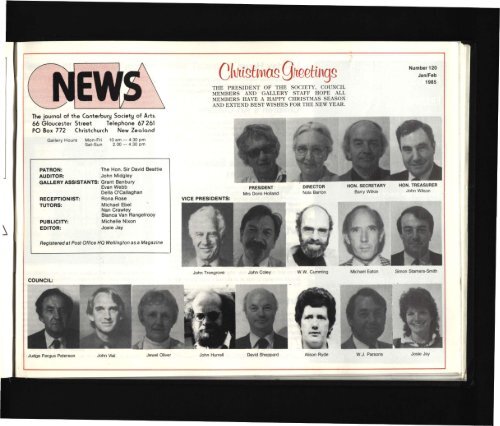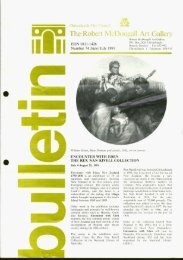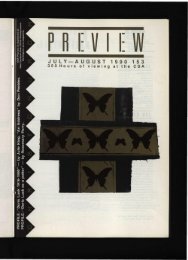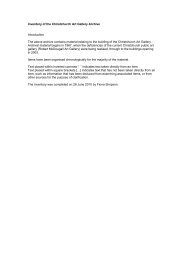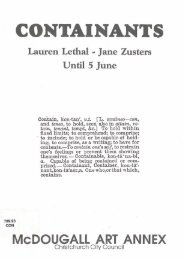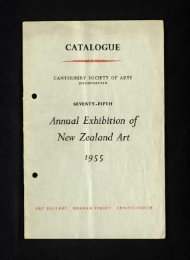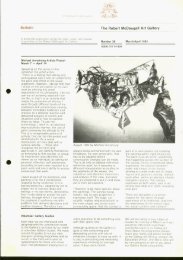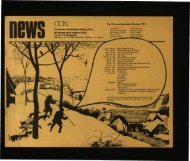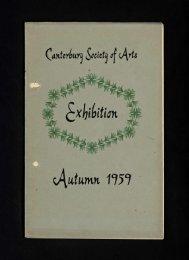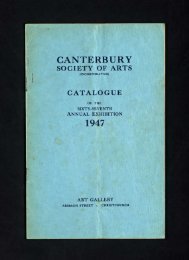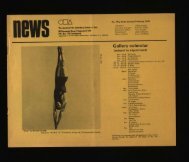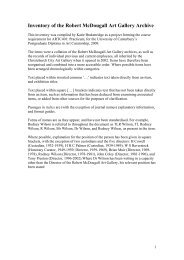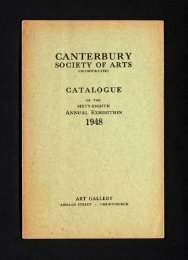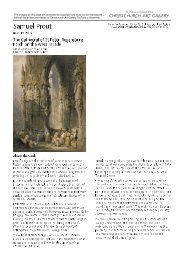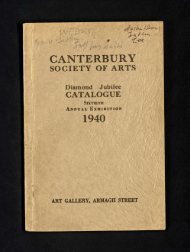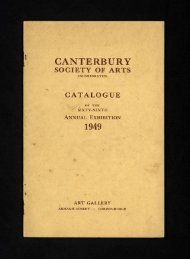Download (6.2 MB) - Christchurch Art Gallery Te Puna O Waiwhetu
Download (6.2 MB) - Christchurch Art Gallery Te Puna O Waiwhetu
Download (6.2 MB) - Christchurch Art Gallery Te Puna O Waiwhetu
You also want an ePaper? Increase the reach of your titles
YUMPU automatically turns print PDFs into web optimized ePapers that Google loves.
The journal of the Canterbury Society of <strong>Art</strong>s<br />
66 Gloucester Street <strong>Te</strong>lephone 67 261<br />
PO Box 772 <strong>Christchurch</strong> New Zealand<br />
<strong>Gallery</strong> Hours Mon-Fri<br />
Sat-Sun<br />
10 am<br />
2.00<br />
• 4.30 pm<br />
4 30 pm<br />
PATRON:<br />
The Hon. Sir David Beattie<br />
AUDITOR:<br />
John Midgley<br />
GALLERY ASSISTANTS: Grant Banbury<br />
Evan Webb<br />
Delia O'Callaghan<br />
RECEPTIONIST: Rona Rose<br />
TUTORS:<br />
PUBLICITY:<br />
EDITOR:<br />
Michael Ebel<br />
Nan Crawley<br />
Bianca Van Rangelrooy<br />
Michelle Nixon<br />
Josie Jay<br />
Registered at Post Office HQ Wellington as a Magazine<br />
COUNCIL:<br />
VICE PRESIDENTS:<br />
Ctetmas yiteefjmgg<br />
THE PRESIDENT OF THE SOCIETY, COUNCIL<br />
ME<strong>MB</strong>ERS AND GALLERY STAEF HOPE ALL<br />
ME<strong>MB</strong>ERS HAVE A HAPPY CHRISTMAS SEASON<br />
AND EXTEND BEST WISHES FOR THE NEW YEAR.<br />
PRESIDENT<br />
Mrs Doris Holland<br />
DIRECTOR<br />
Nola Barron<br />
Number 120<br />
Jan/Feb<br />
1985<br />
HON. SECRETARY HON.TREASURER<br />
Barry Wilkie John Wilson<br />
John Trengrove John Coley WW. Cumming Michael Eaton Simon Stamers-Smith<br />
Judge Fergus Paterson John Vial Jewel Oliver John Hurrell David Sheppard Alison Ryde W.J. Parsons Josie Jay
PRINTS ...<br />
RESTORING ...<br />
For Selection . . .<br />
F I S H E R S<br />
ART DEALERS SINCE 1870<br />
ORIGINALS ...<br />
We offer a COMPLETE SERVICE -<br />
SELLING—BUYING—VALUATIONS-<br />
EXPERT CLEANING-RESTORING<br />
GILDING AND ANTIQUE<br />
H. FISHER & SON LTD<br />
Fine <strong>Art</strong> Dealers 691 Colombo Street<br />
(Between Cashel and Hereford Streets)<br />
Holiday Hours<br />
The gallery will be closed from Monday, December 24, until<br />
Saturday, January 5, 1985. It will re-open in the afternoons<br />
only until Friday, January 18 when normal hours will resume.<br />
Children's <strong>Art</strong> Classes<br />
A holiday art workshop for children will be held on each<br />
morning of the 22, 23, 24 and 25 January, 1985.<br />
Fees: $10 members, $12 non-members.<br />
Please phone the gallery to enrol, and pay before<br />
January 18.<br />
1985 Children's Saturday<br />
Morning Classes<br />
Enrolment for the first term closes on February 1. Parents<br />
should pre-enrol by phoning the gallery (67-261) and<br />
confirm by paying fees before February 1 to ensure a place.<br />
Fees $24 members, $27 non-members. 1985 classes<br />
begin at 9.30 a.m. on February 9.<br />
<strong>Art</strong> Books<br />
We are grateful for the receipt from the estate of the late Mr<br />
and Mrs Stewart Mair of art books and magazines, as well as<br />
documents relating to the building of the new gallery. Some<br />
of these have been given to the MacDougall <strong>Art</strong> <strong>Gallery</strong> to<br />
increase their holding of archival material on Australian<br />
artists and other books may interest our members.<br />
Should you wish to look at or borrow a book please ask at<br />
the office.<br />
<strong>Art</strong>ists Easels<br />
We have been advised of the manufacture of artists easels<br />
of different designs and a wooden carry compact for<br />
materials.<br />
There is a brochure on our noticeboard or you may contact<br />
Riverland Industries.<br />
I. McNally Street<br />
PO Box 249<br />
PHONE: 5709 ASHBURTON<br />
"From Farmgates to Picture<br />
Frames"<br />
Roger Hickin's picture frames have been described as<br />
"weathered wood jewelled with nails". Another reviewer has<br />
termed them "contrived".<br />
Worked mostly from wirebrushed weathered farm timber,<br />
these distinctive frames were seen most recently in<br />
<strong>Christchurch</strong> around Ralph Hotere's 1984 stainless steel<br />
pieces.<br />
In these and earlier collaborations such as the one pictured,<br />
the frames form a part of the imagery of the work as a whole,<br />
but they also work in a less obtrusive/more conventional<br />
sense, for example: as a sensitive edge to recent Rakaia<br />
River paintings of G.T. Moffitt and wild Otago Harbourscapes<br />
of Anna Caselberg. While Roger finds that his frames<br />
provide an authentic embrace ("a frame is a kind of<br />
embrace") for works such as these, he feels he is able to<br />
make frames (both rough wire-brushed ones and more<br />
highly-finished oiled ones) to suit many kinds of work,<br />
originals and prints. He may be contacted at 88 Richardson<br />
<strong>Te</strong>rrace, Opawa, ph. 897-607.
New Zealand Sculpture<br />
Survey 1965-1984<br />
A Comprehensive survey covering the work of some 60<br />
sculptors, including documentation of all facets of New<br />
Zealand Sculpture. Each sculptor provided 5 slides<br />
representative of their work, together with a personal<br />
statement as background reference; biographical details<br />
and an outline of their ideas.<br />
Survey price $165. Order forms available from: Ken Adams,<br />
N.Z. Sculpture Survey, Lynfield College, White Swan Road,<br />
Mt. Roskill, Auckland 4.<br />
UNIVERSITY RESEARCHER WOULD GREATLY<br />
APPRECIATE INFORMATION ABOUT, AND LOCATION<br />
OF, NEW ZEALAND STILL LIFE AND FLOWER-PAINTING<br />
BETWEEN 1880-1940.<br />
ALL REPLIES DEALT WITH IN STRICT CONFIDENCE.<br />
Contact: Ann Elias<br />
c/- Dept. <strong>Art</strong> History<br />
Private Bag<br />
Auckland University<br />
Four Piano Recitals<br />
by Charles Martin<br />
on Thursdays from March 7, 1985,<br />
between 12.15 p.m. and 1.15 p.m.<br />
The <strong>Gallery</strong> will be sponsoring a further series of Recital-<br />
Lectures by Mr Martin.<br />
His programme will include sonatas by Beethoven; suites by<br />
MacDowell, Coleridge-Taylor, and Greig; airs with variations<br />
by Beethoven, Handel and Hummel. Arrangement of<br />
airs such as "Greensleeves" by Vaughan Williams will be<br />
included in the programme.<br />
Mr Martin is well-known for these recitals, and the C S A<br />
warmly supports them, and cordially invites your attendance<br />
at them.<br />
Admission:<br />
$5.00 for the whole series.<br />
$1.50 for single recitals.<br />
Please phone 67-261 or call at the <strong>Gallery</strong> to enrol.<br />
Nine Tubes<br />
"In sixteen weeks I can teach them everything," says<br />
Michael Ebel, tutor of the CSA's adult art classes.<br />
He has concentrated next years' courses into two stages<br />
each of eight weeks' duration. As part of his aim to make<br />
painting "as simple as possible" he restricts the students to<br />
nine tubes of paint each (which, as he points out, also works<br />
out cheaper). With these nine tubes they can mix all the<br />
colours they'll need.<br />
He compares painting to cooking or gardening.<br />
"There's nothing mystical about it. There are certain<br />
ingredients which you can put together as you like."<br />
But you must know which ingredients to use. If you don't, he<br />
warns, you'll have the same results as a would-be gardener<br />
who doesn't know water is necessary to make plants grow.<br />
Michael questions the concept of innate artistic talents. He<br />
believes everybody is, or has the potential to be, an artist.<br />
"There isn't a single person you can't teach the ingredients<br />
of the theory of painting to."<br />
His teaching methods involve giving people the facilities and<br />
knowledge to enable them to do what they want to do, not to<br />
follow any particular style, but to "paint like themselves".<br />
At the end of the course he has noted that the paintings<br />
"end up looking like the people who paint them".<br />
There are usually about twelve people to a class mostly<br />
women since classes are held during the day. Everyone, no<br />
matter what their previous experience, starts from the<br />
beginning.<br />
Anyone interested in next year's classes should ring the<br />
gallery for more information and dates. Classes will begin in<br />
February.<br />
by Michelle Nixon<br />
MERIVALE<br />
VILLAGE<br />
FLORIST<br />
Ruth Bain<br />
Diploma N.Z.P.F.<br />
Shop 4<br />
Merivale Mall<br />
Papanui Road<br />
<strong>Te</strong>lephones 559-738<br />
After Hours<br />
557-253 or 528-577<br />
MALING & CO<br />
WINE MERCHANTS<br />
86 GLOUCESTER STREET<br />
Bin ome a \ riend<br />
795-470<br />
ROBERT M (<br />
DOUGALL<br />
ART GALLERY<br />
Brochures available from CSA<br />
The McDougall <strong>Gallery</strong> or Secretary<br />
<strong>Te</strong>lephone 487-482
Selling <strong>Gallery</strong><br />
What could be more truly original as a Christmas present<br />
than a painting or artist's print from the CSA's extensive<br />
stock?<br />
Original paintings ranging from early works by Cecil Kelly<br />
to contemporary artists such as Emily Jackson — the<br />
gallery staff are delighted to help people find something<br />
to suit their home or office. <strong>Art</strong>ists whose work is<br />
available from the Selling <strong>Gallery</strong> include:—<br />
Cecil Kelly early works<br />
Rata Lovell-Smith<br />
Emily Jackson<br />
Doris Lusk<br />
Margaret Woolley<br />
Heather Person-Hill paintings<br />
Owen Lee<br />
Valerie Heinz<br />
John Coley<br />
Wallace Crossman<br />
Sally Eden<br />
Neil Frazer<br />
Derek Margetts<br />
Philip Trusttum<br />
Also new prints by Gordon Crook<br />
Margaret Elliot, Makara North Aspect.<br />
Dreams and Illusions<br />
The gallery is mounting an exhibition of prints and<br />
photographs entitled "Dreams and Illusions" in the new<br />
year.<br />
Barry Cleavin, tutor in printmaking, and photography tutor<br />
Lawrence Shustak, both of the University of Canterbury<br />
School of Fine <strong>Art</strong>s, have recommended the artists invited to<br />
submit work. Printmakers and photographers from all over<br />
the country will participate in what promises to be an<br />
interesting and stimulating exhibition.<br />
The preview will be held at 8 p.m. on February 27, and the<br />
exhibition will run till March 10.<br />
Autumn Exhibition for<br />
Working Members<br />
Receiving date for work submitted for the Autumn members'<br />
exhibition is April 1, 1985. Preview on April 3.<br />
Summer <strong>Art</strong> School<br />
Waikato Society of <strong>Art</strong>s<br />
7th-11th January<br />
TUTORS: Carole Shepheard — an experimental workshop<br />
that explores symbols and imagery in a variety of ways.<br />
Susan Poff — watercolour and drawing.<br />
Stanley Palmer — printmaking — monoprinting, woodcutting<br />
and etching.<br />
Course Fee — $95.<br />
Enrolment — Waikato Summer School<br />
School of <strong>Art</strong><br />
PO Box 1018<br />
HAMILTON. Ph 394-481.<br />
The New Zealand Academy<br />
of Fine <strong>Art</strong>s<br />
Caltex <strong>Art</strong> Award 1985<br />
Landscape<br />
An exhibition of painting, drawing and sculpture showing<br />
wilderness and rural scenes and activities in New Zealand<br />
Last Receiving Day — Tuesday 29th January.<br />
Season — 24 February-17 March.<br />
Entry forms available from: —<br />
The Director,<br />
N.Z. Academy of Fine <strong>Art</strong>s,<br />
Private, Bag,<br />
Wellington.<br />
The New Zealand Academy<br />
of Fine <strong>Art</strong>s<br />
BNZ <strong>Art</strong> Award 1985<br />
Pots: Sculpture: Prints<br />
An exhibition of pottery, sculpture, photography and limitec<br />
editions of artist's prints.<br />
LAST RECEIVING DAY: Tuesday 9th March.<br />
Season — April 14-28<br />
Entry forms available — address some as above.<br />
^HiBs civ<br />
Stfb<br />
"Because a work does not aim at reproducing natural<br />
appearances it is not therefore, an escape from life — but<br />
may be a penetration into reality, not a sedative or drug,<br />
nor just the exercise of good taste, the provision of<br />
pleasant shapes and colours in a pleasing combination,<br />
not a decoration of life, but an expression of the<br />
significance of life, a stimulation to greater effort in<br />
living."<br />
— Henry Moore —
Views and Reviews<br />
Reflections on Forgery<br />
by Or. Denis Dutton<br />
Elmyr d'Hory, Han van Meegeren, Tom Keating: not the most<br />
celebrated names in the history of modern art, but individuals who<br />
in their way managed to earn a good deal of begrudging respect.<br />
Each was a successful practitioner of an art as old as<br />
connoisseurship itself - the art of forgery. Forgery is a topic<br />
which excites continual interest both in and out of the art world,<br />
and as I have come recently to find out, it remains a topic capable<br />
of arousing some strong - and hard - feelings.<br />
Last year I published an anthology dealing with the purely<br />
aesthetic aspects of art forgery. By a stroke of luck, The<br />
Forger's <strong>Art</strong> (University of California Press) appeared just at the<br />
time of the furor about the Hitler diary forgeries, and as a<br />
consequence the book received a great deal more media<br />
attention in Britain and the United States than it would otherwise<br />
have enjoyed. Most contributors to The Forger's <strong>Art</strong> were, like<br />
myself, academic philosophers, thinkers accustomed to the<br />
imaginative consideration of the odd or extreme - in this instance<br />
some extreme cases of human chicanery and gullibility. The<br />
question they set out to examine was, What difference does it<br />
make if a treasured art work, one which has perhaps hung for<br />
years on a museum wall and given delight to generations of<br />
viewers, is revealed one day to be a forgery? Some of the<br />
contributors argued that who painted a work can make no<br />
aesthetic difference; whether a work is authentic or forged strictly<br />
speaking must be thought of as aesthetically irrelevant. Others,<br />
such as myself, argued that a work's status as original or forged<br />
can, and sometimes must, affect our aesthetic response to the<br />
work.<br />
Without going into the details of these complex - and<br />
sometimes philosophically technical - arguments, it seemed plain<br />
to me, and indeed to the clear majority of reviewers of the book,<br />
that a central issue in the philosophy of art was being raised by<br />
the authors, one which addressed the very question of what in<br />
the end we consider art to be. But here is where events took a<br />
most intriguing turn. For two or three magazine editors who had<br />
received copies of the book sent it out for review not to<br />
academic art historians or philosophers, but to art dealers. The<br />
results were interesting indeed!<br />
Though the book was widely and, pleasant to report, favourably<br />
reviewed, it especially raised the ire of the art dealers who wrote<br />
about it. An art dealer in San Diego dismissed The Forger's <strong>Art</strong><br />
by likening the arguments to the medieval debate about angels on<br />
pinheads, while perhaps the most curious review was a long one<br />
by the well-known New York art dealer, E.V. Thaw. He found it<br />
"appalling" that there should be so much discussion among<br />
philosophers of such a "non-issue" as forgery. After all, he<br />
explained, "very few fakes penetrate the defenses" of<br />
scholarship and the educated eye, and of those that do the vast<br />
majority are "minor and marginal" works. Worse than that, the<br />
book was "dangerous" in the way it promoted a "Philistine"<br />
sensibility.<br />
Thinkers back to Socrates have learned - often to their dismay<br />
- that being dangerous is a lamentably frequent characteristic of<br />
philosophical reflection. But the emotional level of Thaw's reaction<br />
reveals some peculiar things about the nature of the art world.<br />
Clearly, The Forger's <strong>Art</strong> struck a nerve. But why all the<br />
passion? In this respect, some light can be shed on the problem<br />
by engaging in a little thought experiment. Consider the situation<br />
of forgery in the arts of literature and music. What if, for example,<br />
it were discovered that, say, the Schubert Second Symphony or<br />
Dostoyevsky's A Raw Youth were not created by these artists,<br />
but were works by second-rate contemporaries? Some people,<br />
especially scholars who could have invested good portions of<br />
their careers examining and interpreting these works, might be<br />
upset. The libraries or individuals who own the original autograph<br />
manuscripts of these works would be disappointed by the news<br />
but that would be of little import, since the market in such<br />
autograph manuscripts is not large. And histories of Romantic<br />
music and Russian literature would have to be rewritten<br />
accordingly.<br />
But we could expect there would be little of the emotion - the<br />
changes and counter-charges, the angry denunciations - which<br />
almost inevitably characterize such revelations in the world of<br />
painting. The reason, I think, is not that something like the<br />
Schubert Second Symphony is less important in the history of<br />
music than a purported Corot may be in the history of painting:<br />
rather, it is that nobody owns the Schubert symphonies, or any<br />
other uncopyrighted work of literature or music. Disputes about<br />
the authenticity of such works arise less frequently than in the<br />
realm of painting only because there is little incentive to forge<br />
them (even the Hitler forgeries had to have a market to make their<br />
production worthwhile). If, let us imagine, music and literature<br />
were arts that produced unique material objects, objects which<br />
could be owned by individuals or museums - if, for example, one<br />
of the Beethoven quartets were housed in Chicago, while London<br />
held Madame Bovary (and was as unlikely to return it to its<br />
homeland as the Elgin Marbles) - then we could expect<br />
disagreements about musical and literary authenticity to be as<br />
loud and protracted as similar debates about Rembrandts and<br />
Picassos.<br />
tip: P3CT3RE §T)0P<br />
i Campbell Grant 196 Hereford Street, <strong>Christchurch</strong><br />
ARTISTS - have your pictures framed in our<br />
specialist shop (near Latimer<br />
Square) Large range of Mouldings<br />
10% discount for C.S.A.<br />
Members.<br />
Fine Jewellery<br />
in gold and silver<br />
Guenter Taemmler<br />
by<br />
C S A <strong>Gallery</strong><br />
66 Gloucester Street<br />
Carina Jewellers<br />
Caratelle Jewellery<br />
15 Chancery Lane<br />
Merivale Mall<br />
Antiques 1<br />
Genuine and Professionally<br />
ualified Antique Restorers and<br />
Healers are themselves very rare in<br />
New Zealand.<br />
But t here is one such firm in<br />
<strong>Christchurch</strong>.<br />
They are John Morrison and<br />
his son Ross who are top of<br />
the tree in their unique<br />
profession. Both John and<br />
Ross would welcome you to<br />
visit them at work and<br />
answer your quest ions on<br />
antiques and show you some<br />
of the magnificent piecec<br />
they have.<br />
CALL NOW<br />
OR PHONE 790-408<br />
UCMHeiO°<br />
5 UVIWGt?<br />
of Victoria &ntiqueg<br />
8 LIVINGSTONE STREET<br />
(Oil Fil2gerald Ave, between Lichfield Ave and Tuam Si
Paintings become property, and property has monetary, as well<br />
as aesthetic value So it was that I found with The Forger's <strong>Art</strong><br />
that even to raise as an abstract philosophical problem the<br />
question of the aesthetic relevance of forgery was to touch if not<br />
the nerves of art dealers, then apparently their pocketbooks. A<br />
few years ago a British television group began production of a<br />
series of programmes on forgeries. They found that they had no<br />
difficulty gaining the cooperation of major British dealers and<br />
auction houses, so long as it was thought that the programme<br />
was to be a series on art. As soon as they mentioned their<br />
interest in forgery, doors were closed, phone calls went<br />
unanswered, and many of the people who deal with art in Britain<br />
were generally unavailable for comment. Such experience does<br />
not increase one's sense of confidence in those who trade in art<br />
as merchandise, nor in my case does E.V. Thaw's shrill<br />
insistence that forgery is not a problem, since the educated eye<br />
- presumably his and his fellow dealers - can spot important<br />
fakes.<br />
Han van Meegeren: The Adulteress (1943). After van Meegeren<br />
sold this "Vermeer" it ended up in the private collection of<br />
Hermann Goering. A few days after the end of the war, van<br />
Meegeren was accordingly arrested for having sold a Dutch<br />
national treasure to the enemy. It was only then that he revealed<br />
himself as the painter of a whole series of forgeries of Dutch<br />
Masters.<br />
The problem we all feel is that educated eyes, particularly when<br />
they have a pecuniary interest in the works they assess, can see<br />
more what they want to see than what is actually there. This has<br />
been demonstrated in such famous cases as that of Han van<br />
Meegeren, the modern Dutch forger whose "Vermeers" were<br />
lauded as outstanding additions of the body of seventeenthcentury<br />
Dutch painting when they first came to light in the late<br />
1930s. Dutch museums for a while were in virtual competition to<br />
acquire these paintings, which to us in easy retrospect look<br />
pretty awful indeed. Yet so proud were the scholars and curators<br />
of these canvases that one was even suggested as the greatest<br />
of all the works of Vermeer.<br />
Forgery is a crime, and ought to be so considered. But not only<br />
does the forger commit fraud against some unsuspecting<br />
individual, what is worse, he falsifies our view of the history of art.<br />
The van Meegeren forgeries, had they continued to succeed,<br />
would have required a radical alteration of our view of the oeuvre<br />
of Vermeer, and moreover seventeenth-century Dutch art in<br />
general. And who knows what treasured "standards" might not<br />
have the origins conventionally ascribed to them? The greatest<br />
danger, of course, is not modern forgeries, "old" paintings done<br />
from scratch, but of the intentional or inadvertent misattribution of<br />
the works of minor artists. Sophisticated techniques exist to apply<br />
to minor works the signatures of major artists, thereby vastly<br />
increasing their monetary, if not aesthetic value. How common<br />
this is is difficult to say, since the successful cases are, by<br />
definition, undetected, and many detected cases, human nature<br />
being what it is, go unreported. What dealer or collector or<br />
curator wants, after all, to admit having been bamboozled?<br />
The van Meegeren episode is often recounted with an air of<br />
smug triumph: look what happened to those snobs and experts!<br />
But we all ought to take the tale as cautionary. Forgers have a<br />
way - it's their job - of playing not simply on our gullibility, but on<br />
our vanity as well. Van Meegeren carefully studied the art<br />
historical writings of his time in order to devise paintings which<br />
would perfectly fulfil scholarly expectations about what sort of<br />
Vermeers might turn up in the present century. Moreover, like<br />
every other forger, his works inevitably carry the stamp of his<br />
own time. He gave the European sensibility of the 1930s<br />
paintings which fit exactly how it wanted to see Vermeer. The<br />
vision presented was not so much an imitation of Vermeer's as it<br />
was an invention - and what was invented was a 1930s image of<br />
how Vermeer ought to have seen the world. Little wonder that<br />
some critics were willing innocently to claim that these newly<br />
discovered "Vermeers" were the finest of all the paintings of the<br />
Master of Delft. They were the most accessible to contemporary<br />
eyes.<br />
And who can be certain that there isn't at work in some studio<br />
in Fairlie or Hokitika an antipodean van Meegeren, providing a<br />
hungry New Zealand market with Gulleys and Goldies, canvases<br />
which may in their way appeal to us more even that the authentic<br />
Han van Meegeren: Lady and Gentleman with Spinet (1932).<br />
works of these artists? Laugh if it pleases - but don't forget to<br />
cast a glance over the mantlepiece!<br />
Editors note: Dennis Dutton, formerly Professor of Philosophy<br />
at the University of Michigan, now teaches the philosophy of art<br />
in the School of Fine <strong>Art</strong>s, University of Canterbury. He is Editor<br />
of the journal Philosophy and Literature.
The Summer Landscape,<br />
pruned to please<br />
Reviewed by Pat Unger<br />
The Summer Exhibition of 1984 contains approximately one<br />
hundred and fifty works (selected from over two hundred) by<br />
ninety-six artists and the resulting diversity presents a<br />
problem for review.<br />
How can such a group of unrelated pictorial facts be<br />
reasonably approached to discuss? In the absence of any<br />
clearly defined styles or schools the works, by image, fall<br />
into five obvious categories. All too familiarily these divisions<br />
are land/seascape, vegetation, dwellings and outhouses,<br />
still lifes, and figure (human and animal) studies.<br />
The faithful gallery goer will be pleased to see the work of<br />
many familiar painters well represented. Owen Lee, Annie<br />
Baird, Rosemary Roake, Lily Lewis, Barbara Fowler, Kath<br />
van Tunzelmann, Mollie Aitkens, E.E. Deans and Gussie<br />
Fenton all have excellent examples of their style of work on<br />
show.<br />
Rainy Afternoon by Robyn Willett, Avenue the Groynes by<br />
Ngaio Stupples, He Died for Me by Paul Rees, Weeds by<br />
June Gibbs, South Wind by Colin MacLaren and The<br />
Hunter by Harry Phillips. All impressed me as works that<br />
utilise the unique quality of their chosen medium.<br />
The uncompromising clarity of Chancery Lane by Nathan<br />
Crossan achieved by the pen and ink dot technique stopped<br />
me instantly, as did Mapua Road by Dawn Barry. This<br />
painting shows the eyecatching but intolerant quality of<br />
acrylic and the impact is further reinforced by reducing the<br />
landscape to stylised elements. A real gallery work.<br />
Picnic Time by Daphne Rolston and North Easterly by<br />
Irene Ford both make use of established styles with different<br />
results. Picnic Time with its colour divisions, Cezanne type<br />
bushstrokes and hints of Cubism, but without a clear<br />
understanding of the theories behind their styles ends up as<br />
merely an exercise in design and colour, whilst North<br />
Easterly, with Matisse—like bushstrokes manages to<br />
sustain a feeling of movement and freshness in the work.<br />
Facet An egg tempera work by Josie Jay fails in comparison<br />
to Monday Morning Glenorchy also in egg tempera by Sam<br />
Mahon. His skill with this medium is obviously great and in<br />
his other work, The Administrators he gives us his unique<br />
view of a blighted working group of bureaucrats.<br />
Entire by Josie Jay in oil, after the style of Cezanne has<br />
what her egg tempera lacks, form brought to life by sparkling<br />
colour and an animated painterly surface.<br />
High Alpine Landscape Craigieburn by Michael Eaton is<br />
immaculately painted but the arbitrary elongation of the<br />
canvas gives an almost old-fashioned feeling to the Alps, as<br />
if being viewed through a revolving camera obscura.<br />
Worsely Spin <strong>Christchurch</strong> by Maurice Askew must be<br />
one of the most appealing landscapes in this Exhibition<br />
Whimsay, reason and a sense of design add up to a work of<br />
competence by an experienced artist, and at a most<br />
reasonable price.<br />
Works that do not fit into any of these categories are few and<br />
far between. Fallow a tightly knit composition and Oracle<br />
both by Keith Morant are pictorially satisfying.<br />
Ancient Space by Paul Drake, the back of which I must<br />
confess, I found structurally impressive and the Rite of<br />
Spring a wooden sculpture by L. Summers are both of<br />
interest, but not necessarily for their overt imagery. What<br />
are the Rites of Spring?<br />
Isolde Lew Summer's other submission is of a massive<br />
floating woman carved in totara on a marble base. The<br />
compactness, along with the grossness of this work help to<br />
create a feeling of tension and curiosity which is a hall mark<br />
of Summer's uniqueness.<br />
This year the C.S.A. has as Guest Exhibitor Chrystabel<br />
Aitken, whose work goes as far back as the twenties.<br />
Plaster, ceramic and metal sculpture, metalwork, painting<br />
and jewellery illustrate the range of versatility of her art and<br />
craftwork.<br />
The dictionary definition of tension is the "state of being<br />
tightly stretched, supressed, excitement . . ." This quality I<br />
find lacking in many of the works which are otherwise well<br />
painted, cautious but competent, domestic more than<br />
gallery oriented, an improvement on 1983.<br />
Gefh.<br />
crafts<br />
co-operative<br />
for Canterbury craftworks<br />
79 Cashel St (City Mall)<br />
near Bridge of Remembrance<br />
<strong>Christchurch</strong>, New Zealand .<br />
WINDSOR GALLERY LTD<br />
(FORMERLY SMITH & HODGSON)<br />
OUR NEW GALLERY IS THE MOST<br />
SPACIOUS IN CHRISTCHURCH<br />
QUALITY PICTURES ARTISTIC FRAMING<br />
153 HIGH STREET<br />
(OPP. HURST & DRAKE) PHONE: 60 724<br />
As your<br />
TRUSTEE AND EXECUTOR<br />
appoint<br />
PYNE GOULD GUINNESS LTD<br />
Your Local Firm<br />
POTTERY<br />
WENING<br />
PAINTINGS<br />
SPINNING WHEELS<br />
HOMESPUN KNITWHR<br />
WOODTURNED BOWLS<br />
HANDCRAFTED TOYS<br />
several arts<br />
impul/e in<br />
quality craft and natural fibre/<br />
807 COLO<strong>MB</strong>O ST.PH.69-264
ROWNEY • ,<br />
Top Quality<br />
<strong>Art</strong>ists Materials<br />
Oil Colours, Water Colours, Acrylic Colours,<br />
Brushes, Palettes — Everything for the <strong>Art</strong>ist<br />
MANUFACTURERS OF ARTISTS MATERIALS<br />
SINCE 1783<br />
Property Owners! When selling consult<br />
AUCTIONEERS & REAL ESTATE AGENTS<br />
133 WORCESTER STREET, CHRISTCHURCH<br />
The Brush Stroke — from<br />
'The <strong>Art</strong> Spirit' by Robert Henri<br />
continued from last issue<br />
Great results are attained by the pressure, force or delicacy<br />
with which the stroke is made.<br />
The choice of brushes is a personal affair to be determined<br />
by experience.<br />
Too many brushes, or too many sorts of brushes cause<br />
confusion. Have a broad stock, but don't use them all at<br />
once.<br />
It is remarkable how many functions one brush can perform.<br />
Use not too many, but use enough.<br />
Some painters use their fingers. Look out for poison. Some<br />
pigments are dangerous — any lead white, for instance.<br />
Silk runs, is fluent, has speed, almost screams at times.<br />
Cloth is slower, thicker, the stroke is slower, heavier.<br />
Velvet is rich, caressing, its depths are mysterious,<br />
obscure. The stroke loses itself, not a sign of it is visible. So<br />
also the shadows in hair.<br />
Strokes which move in unison, rhythms, continuities<br />
throughout the work; that interplay, that slightly or fully<br />
complement each other. See pictures by Renior.<br />
Effects of perspective are made or defeated by sizes of<br />
strokes, or by their tonalities.<br />
There are bush handlings which declare more about the<br />
painter than he declares about his subject. Such as say<br />
plainly: "See what vigour I have. Bang!" "Am I not graceful?"<br />
"See how painfully serious I am!" "I'm a devil of a dashing<br />
painter — watch this!"<br />
Velasquez and Franz Hals made a dozen strokes reveal<br />
more than most other painters could accomplish in a<br />
thousand.<br />
Compare a painting by Ingres with one by Manet and note<br />
the difference of stroke in these two very different men. The<br />
stroke is like the man. I prefer Manet of the two. But that is a<br />
personal matter. Both were very great artists.<br />
Compare the paintings if they are within your reach, if not<br />
compare reproductions. Compare also Ingres' drawings with<br />
those of Rembrandt.<br />
Manet's stroke was ample, full, and flowed with a gracious<br />
continuity, was never flip or clever. His "Olympia" has a<br />
supreme elegance.<br />
Icy, cold, hard, brittle, timid, fearsome, apologetic, pale,<br />
negative, vulgar, lazy, common, puritanical, smart, evasive,<br />
glib, to add to the list and repeat a few. Strokes of the brush<br />
may be divided into many families with many members in<br />
each family. A big field to draw from and an abundant series<br />
of complements and harmonies among them; to use as units<br />
in the stress and strain of picture construction. Perhaps<br />
there is not a brush mark made that would not be beautiful if<br />
in its proper place, and it is the artist's business to find the<br />
stroke that is needed in the place. When it is in its proper<br />
place, even though it bore one of the hateful names I have<br />
given some of them, it is transformed, and it has become<br />
gracious or strong and must be renamed.<br />
The picture that looks as if it were done without effort may<br />
have been a perfect battlefield in its making.<br />
A thing is beautiful when it is strong in its kind.<br />
What beautiful designs a fruit vendor makes with his piles of<br />
oranges and apples. He takes much trouble and I am sure<br />
has great pleasure in arranging them so that you can see<br />
them at their best.<br />
A millionaire will own wonderful pictures and hang them in a<br />
light where you can't half see them. Some are even proud of<br />
the report, "Why, he has Corots in the kitchen — Daubignys<br />
in the cellar!"<br />
It is up to the artist to make the best pictures he can possibly<br />
make, it is up to the owners to present them to the very best<br />
advantage.<br />
The good things grow better. There is always a new surprise<br />
each time you see them.<br />
The man who has something very definite to say and tries tc<br />
force the medium to say it will learn how to draw.<br />
Keep as far as possible all your studies, all your failures, if<br />
somewhere in them appear any desirable qualities.<br />
Such canvases are good for reference. Later study of the<br />
work recalls the good of it.<br />
Sometimes an old unfinished canvas will serve as a recall<br />
from lesser and unimportant wanderings.<br />
You can learn much from others but more from yourself. Ir<br />
looking at an incomplete canvas sometime after its doing<br />
the whole thing becomes clear, the tangle dissolves, and<br />
you see the way to complete it and how certain faults may<br />
be avoided.<br />
Don't be ashamed to keep your bad stuff. After all you did it.<br />
It is your history and worth studying.<br />
Shame makes a small man give up a lot of time smearing<br />
over and covering up his rough edges.<br />
There is a wonderful work of art by Leonardo da Vinci, one<br />
of his most interesting. It is quite unfinished, yet perhaps it is<br />
one of his most finished, gets us in deeper. No work of art is<br />
really ever finished. They only stop at good places.<br />
Shame is one of the worst things that ever happened to us<br />
There is weakness in pretending to know more than you<br />
know or stating less than you know.
(ex^ibiti^s<br />
Children's <strong>Art</strong> Exhibition<br />
Children who have taken part in the gallery's Saturday<br />
morning classes are having an exhibition of their best work<br />
on Saturday, December 8, at 11 a.m.<br />
Edward MacKenzie N-Z<br />
Preview Tuesday 12th February 1985<br />
1 arrived in this country from England in July, 1982. The first<br />
work I did here was the beginnings of this Exhibition. My<br />
next project was working out some of my long English<br />
experience by my 'English Seaside' work, culminating in<br />
exhibitions in Auckland and Wellington. I then returned in<br />
earnest to my New Zealand orientated work, having by then<br />
accrued enough New Zealand experience to reflect and<br />
make comment upon.<br />
My early training and background as an <strong>Art</strong>ist was in Graphic<br />
Design. Typographic devices and solutions are bread and<br />
butter to the Designer — something one inherently turns to<br />
when looking to communicating impressions and ideas. The<br />
germ of the present Exhibition stems from a simple but<br />
powerful concept. Powerful, I think, because of, rather than<br />
inspite of its simplicity. The letters N and Z are each made of<br />
one diagonal and two parallel lines — together they comprise<br />
2 horizontals, 2 verticals and 2 reverse diagonals. Such a<br />
provident, elegant combination of letter forms is a gift to<br />
explore — the bread and butter idea becoming a feast. Such<br />
a leavening provides space to investigate within the bounds<br />
of a 'simple' idea.<br />
The entire Exhibition is composed only of the letters N and Z<br />
used together in myriad ways — however juxtaposed, in<br />
whatever scale, in whatever medium, however ganged-up,<br />
the letters NZ are every omnipresent, the product of an<br />
energetic economy. The basic NZ idea lends itself to so<br />
many applications I have been tempted to specialise in one<br />
single area e.g. solutions using just screen prints, just<br />
cuisenaire rods, just photos, just matchboxes etc. However,<br />
I felt it more appropriate to develop the idea along many<br />
facets — a pot pourri of application.<br />
I first showed the work at the RKS <strong>Gallery</strong> in Auckland in<br />
June, 1984. Since then I've worked to refine that initial large<br />
effort.<br />
It is my intention that the assorted works read more than a<br />
collection of individual designs. I look upon this Exhibition as<br />
a collective statement about this, to me, new, exciting land.<br />
SILVERWOOD FIBRECLAY —<br />
Exploration in Colour<br />
Preview February 12 at 8 p.m.<br />
This is an exhibition by a group of people who are in the<br />
process of exploring the colour possibilities inherent in the<br />
media in which they are working. Each is extending their<br />
approach by incorporating new techniques or new materials<br />
into their work.<br />
Peacock feathers, azurite and malachite are combined with<br />
silver; subtle shades of colour are produced by the edge<br />
effects of shino glaze over metal oxides; graduation in<br />
shading and complex patterns arise from differential dying of<br />
wool; finely turned wood explores the full range of colours<br />
inherent in the natural patterns of tree growth.<br />
Penny Hughes<br />
Mark Piercey<br />
Goldie Maxwell<br />
Robyn Hetherington<br />
Larry Field<br />
Sally-Ann Griggs<br />
Mary-Catherine Jackson<br />
jftush n paleMj<br />
artists<br />
supplies<br />
Bells Arcade<br />
Cashel Street<br />
\<br />
f<br />
John Rooney<br />
Phone 63-088<br />
Available at<br />
G.B.D. PRINTS LTD<br />
207 Cashel St. (Opp; The Farmers)<br />
<strong>Te</strong>lephone 60 033<br />
A comprehensive range of artists' materials:<br />
Acrylic, oil & water colours, brushes, papers,<br />
drawing blocks, easels, mounting boards and art<br />
accessories.<br />
The <strong>Gallery</strong> is interested in handling<br />
the re-sale of early paintings and has<br />
collectors inquiring for such work.<br />
Please enquire at the office.<br />
C.S.A. GALLERY
BEALEY GALLERY<br />
Quality Picture Framing<br />
Exhibition Pottery<br />
Chnsties Contemporary <strong>Art</strong><br />
Director: John Simpson<br />
<strong>Te</strong>lephone 67-506<br />
Private 583-351<br />
59 Victoria St<br />
P.O. Box 25045<br />
Victoria St <strong>Christchurch</strong><br />
Cashmere <strong>Gallery</strong><br />
12 Colombo Street<br />
at the foot of the hills<br />
for<br />
Pottery by N.Z. Exhibition Potters<br />
Paintings, Jewellery, Handcrafts, Lamps<br />
"Rjtchi^zs<br />
finpfHs <strong>Gallery</strong><br />
The only fine arts gallery<br />
specialising in early colonial<br />
Australian and New Zealand<br />
works of art.<br />
Continually changing<br />
EXHIBITIONS<br />
all for sale.<br />
Next to the CSA gallery,<br />
72 Gloucester Street, <strong>Christchurch</strong>,<br />
New Zealand, Ph. 795-710<br />
Chrystabel Aitken<br />
(Mrs Gordon Mc<strong>Art</strong>hur)<br />
Preview 23 January at 8 p.m.<br />
Chrystabel Aitken was born in Waikaka Valley, Southland.<br />
Her parents moved to a mixed farm (Kyledale) in Tuturau<br />
where she spent her schooldays. Her love of animals dates<br />
from this period. She rode a spirited trotter every week into<br />
Gore, to receive tuition from an excellent artist, Christine<br />
Cameron. Her parents, realising that their daughter<br />
possessed outstanding talent, sent her to the Canterbury<br />
College School of <strong>Art</strong>.<br />
Her ambition was to become an animal painter, like the great<br />
French artist, Rosa Bonheur; but the School was principally<br />
concerned with figure, landscape and still-life. She had to<br />
teach herself animal anatomy, though as the exhibition<br />
reveals, she did not neglect the techniques of these other<br />
branches of the <strong>Art</strong>s; and the School awarded her junior,<br />
intermediate and senior scholarships. She was instructed in<br />
animal drawing for a period of years.<br />
The School was doubly fortunate in having Francis<br />
Shurrock, and J.A. Johnstone on its staff. Chrystabel found<br />
recognition and encouragement with these outstanding<br />
aritsts. She became assistant to Shurrock, finding<br />
opportunity to extend her studies, especially in the<br />
modelling and carving of animals. In 1925 she was awarded<br />
the School medal for special excellence in modelling. This<br />
was the only occasion it was awarded to a sculpture<br />
student. She became a member of the <strong>Christchurch</strong> Group,<br />
an elected member of the New Zealand Society of <strong>Art</strong>ists<br />
and a member of the Canterbury Society of <strong>Art</strong>ists.<br />
Apart from a few commercial jobs of doubtful value, jobs for<br />
artists were practically non-existent — even in the teaching<br />
area. James and Alfred Cook ran a milk round. Rita Angus for<br />
a time worked on a sheep station for 7/6 a week and keep.<br />
There was no <strong>Art</strong>s Council, no recognition of the importance<br />
of trained artists in industry; and no scholarships abroad<br />
One exception, James Cook, was given such little support in<br />
his return that he returned to England and subsequently<br />
settled in Australia (as did his brother Alfred).<br />
In 1939, preparations were being made for the celebration<br />
of the New Zealand Centenary by an International Exhibition<br />
in 1940. Chrystabel Aitken, Alison Duff, Mary Burnett, Noel<br />
Ireland and Jack Hutchison found jobs with the official<br />
sculptor. The pay was exceedingly low; but it was a job, and<br />
the work was completed in time for the opening in 1940.<br />
While Alison was entrusted most of the drawing, Chrystabel<br />
did nearly all of the carving. This included a hundred foot<br />
panel, eight high, in the tower block, fifty feet above the<br />
entrance. This was carved in situ, despite the Rongotai<br />
winds. She was also responsible for the decorative work on<br />
the much-admired fountain, including the horses. Her white<br />
rock carving became the centrepiece of the Centennial<br />
Exhibition. A photograph of this work is included in the<br />
current show.<br />
She married Gordon Mc<strong>Art</strong>hur in 1941; and although the<br />
care of her parents heavily curtailed opportunities, she has<br />
continued to produce outstanding works of which the<br />
painting of the horse Cactus dates as recently as 1983.<br />
NOTE: This artist has also done distinguished work in<br />
copper, silver and gold. The jewel caskets, cloisonne<br />
repousse, cast pewter and exquisite jewellery, shown here<br />
are samples of her work. They serve to illustrate the range<br />
and quality of a versatile artist whose craftsmanship is not<br />
confined to one medium.<br />
Chrystabel Aitken was guest artist in the CSA Summer Show<br />
— exhibiting wood and stone carvings, ceramics and<br />
metalwork. This exhibition consists of paintings, drawings<br />
and carvings.
Gordon Crook Prints<br />
January 23 - February 10<br />
Some of the latest prints by this exceptional artist will be on<br />
show from 23 January.<br />
Born in England he studied art at St Martins School of <strong>Art</strong>,<br />
and textile design at the Central School of <strong>Art</strong> and Design.<br />
He emigrated to New Zealand in 1972, before this time he<br />
exhibited mainly tapestries in one-man and group shows.<br />
Exhibitions include Redferns <strong>Gallery</strong>/Scottish <strong>Art</strong>s Council/<br />
London/Houston/Smithsonian Institution/National <strong>Art</strong> <strong>Gallery</strong><br />
and widely in New Zealand.<br />
His most well known commissions are the Banners for the<br />
New Zealand Chancery in Washington and the Auditorium in<br />
the Michael Fowler Centre, Fabric hangings for High<br />
Commission in Tonga and Embassies in Samoa, Mexico. He<br />
has also been involved in theatre sets.<br />
This year Gordon Crook has been represented in the 8th<br />
International Print Biennale, Bradford, and Contemporary<br />
New Zealand Prints 1984, in Japan.<br />
Joyous and colourful, the prints in this small show are from<br />
themes that the artist has been exploring over the past 13<br />
years. Many could be translated into large tapestries such<br />
as those made by Lesley Nicholls under Mr Crook's<br />
direction.<br />
Other prints will be shown in our special March exhibition<br />
titled Dreams and Illusions.<br />
Nancy Thomson<br />
18 December-20 January<br />
These paintings have been received for sale from an art<br />
collection of some note.<br />
Paintings on show range from 1917-56 and are mounted,<br />
and there are other sketches available.<br />
They include delightful small watercolour studies, and flower<br />
studies done in New Zealand and overseas cities.<br />
There is an early 1917 study of Sumner among the works<br />
painted in New Zealand.<br />
Unfortunately we know very little of the artist. If some of our<br />
members may recall anything of her, we would be grateful<br />
for that information.<br />
Embroidery Exhibition<br />
by selected members of the Association<br />
of New Zealand Embroiderers' Guilds Inc.<br />
18 December-20 January<br />
The Exhibition is made up of eleven works by the following<br />
artists:<br />
Jann Pearce Wellington<br />
Helen Guy Wellington<br />
Margaret Jeffery Southland<br />
Shirley Dixon Wellington<br />
Diana Parkes Lower Hutt<br />
Jill McVinnie Hamilton<br />
Joan Forsyth Palmerston North<br />
Barbara Hercus Wellington<br />
Nancy Maxwell Petone<br />
Helen Marshall Wellington<br />
Mina Thomas Wellington<br />
This exhibition has been put together to be of great interest<br />
to the viewer, as well as demonstrate the many facets of the<br />
embroiderers' art, both in the use of the various media and<br />
techniques used by embroiderers, as well as exploring the<br />
truly creative aspects.<br />
Applique, pulled thread work, hand-dyed yarns, patchwork,<br />
surface stitchery, quilting, metal thread work, blackwork<br />
stitching, free-standing works, line stitching, canvas<br />
embroidery, all of these techniques are included in this<br />
exciting exhibition.<br />
The backgrounds of the artists vary from considerable<br />
academic study and qualification, to ecclesiastical<br />
vestments, to skills and styles gradually developed over<br />
many years of personal creative development.<br />
ANZAS thanks the Association of New Zealand<br />
Embroiderers' Guilds in preparing this exhibition, and<br />
selecting the works for exhibition.<br />
ft<br />
'lean Tfitcfiard<br />
NZ A I D<br />
Ikiterior 'Desiqn Considtants<br />
7 St Albans St. MERIVALE<br />
<strong>Te</strong>lephone: 554-679<br />
lighting<br />
Wh[[&<br />
floor<br />
coverings<br />
[fabrics<br />
[Furniture<br />
Accessories<br />
1<br />
ART SERVICES<br />
LTD.<br />
PICTURE FRAMING<br />
PHONE 68-429<br />
241A MANCHESTER STREET<br />
RING, WRITE OR CALL FOR<br />
PROMPT, COURTEOUS ATTENTION<br />
EXPERT CRAFTSMANSHIP AT<br />
REASONABLE PRICES<br />
WE WILL CLEAN. RESTORE AND<br />
REFRAME OLD PICTURES<br />
P.O. BOX 13356 ARMAGH
Judith Cordeaux<br />
'Wrinkled Bellies' are Beautiful<br />
December 18-January 20<br />
Judith Cordeaux knitting a 'wrinkled belly'.<br />
As a child, Lyttelton-based artist Judith Cordeaux was<br />
disturbed by the lines on her mother's stomach. Later, as a<br />
mother herself, she found similar wrinkles on her own belly,<br />
and realised that, like many women she was made to feel<br />
ashamed of this natural phenomenon, "win back your figure<br />
after having a baby — eliminate ugly flab" said one typical<br />
advertisement for an exercise machine. The wrinkled belly,<br />
rather than being accepted as an inevitable and natural<br />
symbol of motherhood, is commonly treated as an object of<br />
disgust.<br />
Judith Cordeaux, however, sees beauty and softness in<br />
these lines associated with childbirth, and they have inspired<br />
a series of joyous works of art. Rather than expressing her<br />
ideas in more conventional media such as painting or<br />
sculpture, she has chosen to knit 'wrinkled bellies', "working<br />
in wool because the fibre reminds me of the softness and<br />
elasticity of skin, and because in our country, working in<br />
wool has been traditionally the work of women, above all,<br />
mothers".<br />
New Members<br />
Mr Eric W. Biddineton<br />
Mr and Mrs John Buxton<br />
Mr G.T. and Mrs MA. Candy<br />
Betty Chambers<br />
Mrs R. Dodds<br />
Mrs G.B. Finnegan<br />
Mr and Mrs B.R. Foster<br />
Mr Michael Glover<br />
Mr and Mrs R.I. Hale<br />
Messrs Hamilton, Hindin Greene (Corporate)<br />
Mrs Caroline Hasselman<br />
Mr S. Isaac<br />
Mrs Marion Lane<br />
Mr and Mrs J.D. Lee<br />
Mr and Mrs C.F. McKay<br />
Mrs Margaret McLeod<br />
Mrs Helen McMaster<br />
Mr and Mrs Paul Manser<br />
Denise and Colin North<br />
Ms Glenys Parry<br />
Mr Arie C. Pronk<br />
Mr and Mrs D.E. Purse<br />
Nancy Ross<br />
Mr P.M. Stewart<br />
Mr H.J. and Mrs G.A. Taylor<br />
Taylor Shaw and Anderson (Corporate)<br />
A.J. Verrall and<br />
M.L.E. Foate<br />
Mr and Mrs I.R. Wood<br />
Mrs L.T. Woods<br />
Childrens <strong>Art</strong> Class<br />
<strong>Art</strong>s Calendar<br />
June Fogden<br />
CSA Summer<br />
Marjorie Galvin and<br />
Helen Dewar<br />
Dolls for Children<br />
Children's <strong>Art</strong><br />
Rick Edmonds<br />
Judith Cordeaux<br />
New Zealand Embroidery Guild<br />
Nancy Thomson<br />
Local <strong>Art</strong>ists<br />
Gordon Crook<br />
Chrystabel Aitken<br />
New Zealand Academy of Fine <strong>Art</strong>s<br />
Margaret Elliot<br />
Photo <strong>Art</strong>s Group<br />
Silver, Wood. Fibre, Clay<br />
Edward MacKenzie<br />
Tomoko McKnight<br />
President's Exhibition 'Dreams and<br />
Illusions'<br />
Batik from Java<br />
Gennie De Lange<br />
Dec/Jan/Feb<br />
Until December 9<br />
Until December 16<br />
Until December 9<br />
Until December 9<br />
Until December 6<br />
December 8-16<br />
From December 9<br />
From December 19<br />
From December 19<br />
From December 19<br />
From December 19<br />
From 24 January-10 February<br />
From 24 January-10 February<br />
13-24 February<br />
13-24 February<br />
13-24 February<br />
13-24 February<br />
13-24 February<br />
From 28 February<br />
From 28 February<br />
From 28 February<br />
From 28 February


